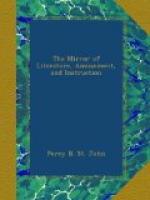This was the country of the ancient Vandals; it was made a duchy about the end of the seventh century; in the tenth, Christianity was introduced, and Boleslaus erected it into a monarchy in 999. The form of government was here very singular: it was the only elective monarchy in Europe, and the Poles, in the choice of a king, did not always confine themselves to a countryman; at one time all nations were eligible. The king was elected by the whole body of the nobility and gentry in the plains of Warsaw, and before this choice they obliged him to sign whatever conditions they thought proper. The Polish armies were not paid by the king; every nobleman or gentleman gave his attendance in time of war, at the head of his vassals, and retired from the fatigues of the campaign when it suited his own inclination. In the year 1779, a singularly bold partition of this country was effected by Russia, Prussia, and Austria; Russia laid claim to part of Lithuania, Polesia, Podolia, Volhinia, and part of the Ukraine. This immense tract of country, containing 8,000,000 souls, is become part and parcel of the Russian territory. Prussia claimed Great Poland, the other part of Lithuania, and Polish Russia. The only part of Poland retained by Prussia, is the Grand Duchy of Posen, containing 538 geographical square miles, and 1,051,137 inhabitants. Its chief towns are Bromberg and Posen. Austria seized on Little Poland and Red Russia, leaving to the King of Poland only Samogitia, Mascovia, and Polachia; even this small territory was wrested from him, and in 1795, he was obliged to resign his crown. That part of Poland which is subject to Austria, bears the designation of the kingdom of Galicia and Lodomiria. Its population amounts to 4,370,000 souls. The present kingdom of Poland is hereditary in the person of the Russian autocrat and his successors, and comprises a superfices of 6,340 square leagues, having a population of 3,850,000 souls. It is divided into eight waiwodeships, namely, Warsaw, Landomir, Kalish, Lublin, Plotzk, Mascovia, Podolachia, and Augustowo. Its rivers are the Vistula, Warte, Bug, Dnieper, Niemen, and Dwina. The national revenues amounted (prior to the present contest) to L2,280,000. sterling, about the seventh part of which was assigned to the civil list. Its military force during the despotic government of the Grand Duke Constantine, was 30,000 infantry, and 20,000 cavalry; at present it is estimated at 70,000 infantry, 20,000 cavalry, and 50,000 men armed with scythes. Warsaw, with 126,433 inhabitants, is its capital, and next stand in succession Landomir, 50,000 inhabitants; Lublin, 12,000; and Kalies, 8,500. The Catholic religion predominates, but the number of Jews and Socinians is great. There are more than 2,000,000 Jews dispersed through Poland, independent of those resident as merchants in the principal towns. Socinius resided many years at Cracow, and married the daughter of a Polish nobleman. According to a distinguished Polish historian, M. Chodzko, the population of the different provinces of Ancient Poland amounted, in 1824, to about 19,000,000 of inhabitants.




